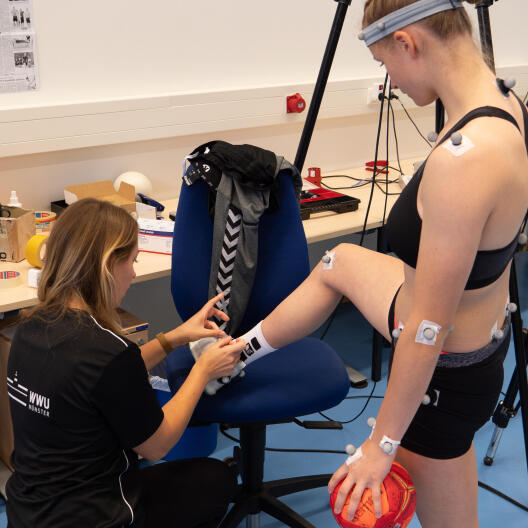Main Research Topics
At the Institute of Sports and Exercise Sciences in Münster, a couple of main topics are addressed and gradually filled content and structure.
- Dynamic Human Systems, with a focus on cognitive neural systems, dynamic motor systems and dynamic social systems
- Social responsibility, with the individual topics of mental and physical health, teaching and learning in an educational context, performance and expertise, social cohesion and integration, as well as the mechanization of living environments.
With this structure, however, no conventional categorization into basic vs. application research or even scientific vs. social science research is meant or intended. The structural perspective offers excellent concepts and methods for analyzing human experience and behavior in various socially relevant fields. The main topics in the area of social responsibility offer complex issues and application contexts for the validation of system-oriented processes and models. These synergies are reflected in the fact that all work units of FB 07 deal with several key topics and are very often involved in both key areas. All topics contain specifications for research, teaching and transfer.
Dynamic Human Systems
Dynamic Human Systems focuses on understanding the underlying processes of complex human experience and behavior and thus providing the basis for predicting and changing health, social, athletic and professional adjustments, decisions and performance. The focus is on three conceptually and methodologically complementary focal points:
(1) Cognitive Neural Systems,
(2) Dynamic Motor Systems and
(3) Dynamic social systems.
These focal points cover a broad spectrum of psychological and sports science research. This breadth is not only in terms of content, but is also reflected in the spectrum of methods, which ranges from neurophysiological and imaging examination methods of the brain to laboratory and field-based behavioral studies and mathematical modeling.
Social responsability
This focus area of research at FB 07 is more application-oriented and includes dealing with current social challenges and the development of suitable solutions. This orientation of research towards social relevance corresponds to the recommendations of the Science Council (2018). In addition, this orientation follows the HEP of the University of Münster and the interlinking of research, teaching and transfer as part of the Excellence Strategy. The goal is the generation of new knowledge and the initiation of transfer processes in the various fields of action in order to communicate and advise scientific results and to enter into a systematic research-practice dialogue.
Central fields of action are
(1) mental and physical health,
(2) teaching and learning in an educational context,
(3) performance and expertise,
(4) social cohesion and integration, and
(5) mechanization of living environments.


